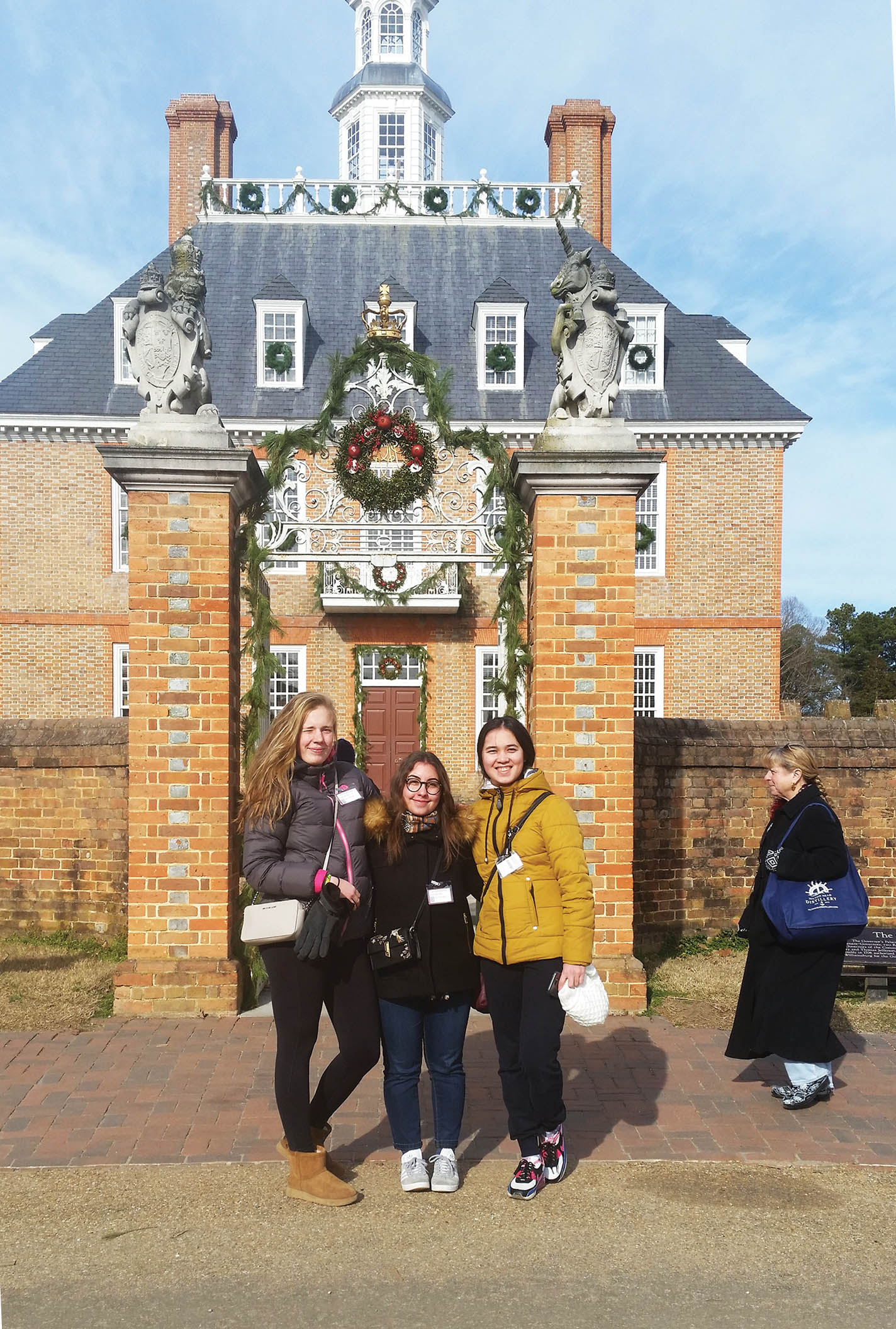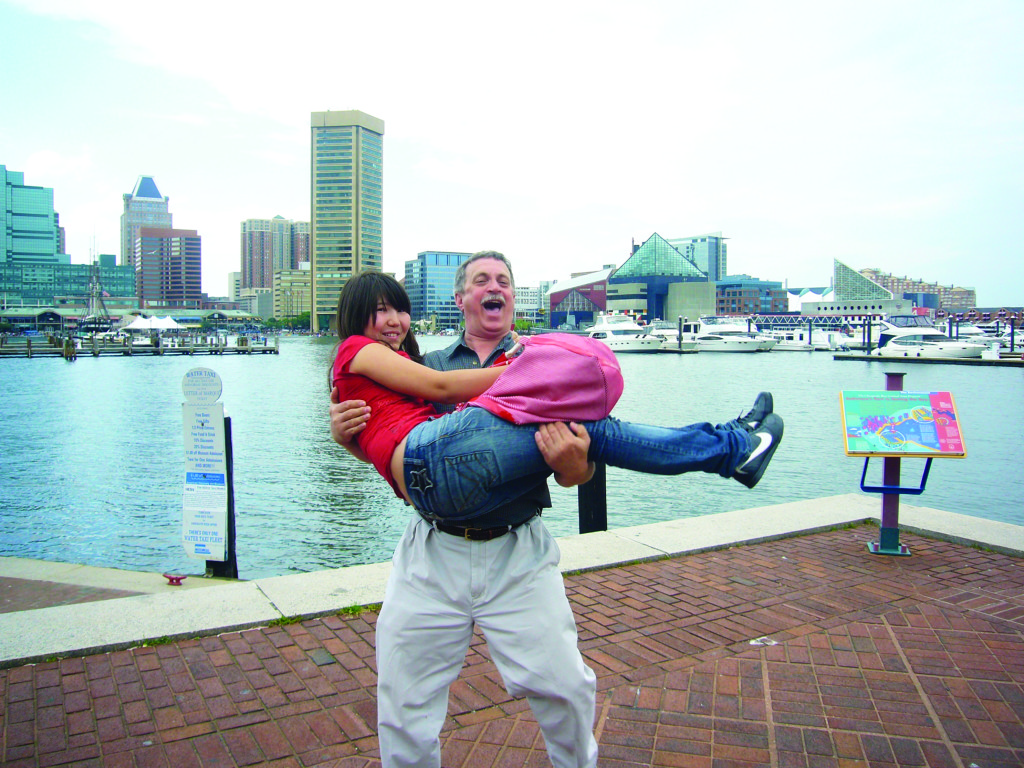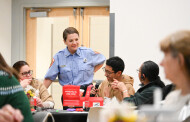At first glance, welcoming a stranger to live in your home for ten months may seem like an outlandish idea. But for families in towns all around Wake County, hosting a teenage foreign exchange student can be the greatest, most meaningful decision they ever make. And when students are hand-picked by Apex couple Erin and Allan Kalbarczyk, Area Representatives of World Heritage Student Exchange Programs, families can’t go wrong.
As host parents to six students since 2005 and area representatives since 2006, the Kalbarczyks are determined to make every host family’s experience as wonderful as their own have been. The process of matching families with students starts with a list and a commitment to efficiency.
Selecting Exceptional Students
Every year, World Heritage (under their parent organization ASSE—American Scandinavian Student Exchange) compiles a national database of foreign students who have been accepted into the exchange program either on their academic merit or as winners of coveted scholarships. Across Spain, for example, one wealthy entrepreneur offers 250 scholarships for study in the United States and 250 for study in Canada.
According to Erin, “The scholarship kids rock the universe. There are thousands of applicants in any of the scholarship countries. Kids come out of the woodwork to apply based on their academics and letters of recommendation. They often have to make a day trip to a testing site and if they pass the exam, there are essays to write along with an interview process.”
A
nother program, started after the Cold War, offers scholarships to students in select countries that were originally part of the former Soviet Republic. Allan explains, “These kids are future leaders, with a good academic background, leadership potential, and presentation skills. Thousands are applying, but that’s whittled down to hundreds.” And they come from uniquely different backgrounds. “One girl came from a farm, ten miles outside of a tiny village. Her first question when she met her host family was, ‘What are my duties with the cows?’ Another student was more cosmopolitan, from a city, with educated parents who were well-to-do.”
Erin begins looking at the growing list of students as early as December, comparing their application packages to the criteria and requirements for foreign exchange students set in place by the Wake County Public School System (WCPSS). “The school system has a lot to do with how we approach things,” she says.
From Allan’s perspective, “Erin knows more about the list than anyone else in the organization. She goes through every student and looks at vaccination schedules, English scores, grades, and everything that WCPSS requires. She narrows the pool and then gets to learn even more about them. She reads their letters to find out what they’re like, what they are interested in, if they’re outgoing, religious…everything. When she meets with a potential host family, she has a subset to draw from.”
Erin calls it “prospecting.” If a student’s package is complete and they match WCPSS requirements based on their age, English scores, and vaccinations, she requests their full profile and records from World Heritage. “I like to place the scholarship winners. They’ve worked hard and they’re grateful. They’re mature, flexible, smart, and they know why they’re here. They know they have a coveted spot that could have gone to someone else.”
Host Families with Open Arms
Erin and Allan have found that most families don’t need convincing when it comes to whether or not to host a student.
“My job is to facilitate,” Erin says. “Many families have already been thinking about it and half the time, they’ve already chosen a student by the time I meet them. I tell first-time host families, particularly, to look for a student who seems like they’d fit into their family already. Do they enjoy the same things your children do? I tell them they’ll feel it when they read the students’ letters. The letter of introduction to a prospective host family is the thing that speaks to people, and I will send families letters from three to five students once I know what that family is looking for. Then we schedule a home visit.”
The Kalbarczyks visit each prospective host family in the family’s own home. At that time, they go over host family guidelines, school expectations, and they answer questions and share their own experiences as host parents. Erin says, “The stories we tell are about things that really happened. The stuff we say is true and I think that’s better than just saying, ‘Oh, it’s going to be great.’ Families are ready to go after the home visit because I tell them everything.”
Due to North Carolina’s late-August traditional calendar start dates, area high schools open their enrollment for foreign exchange student placements from April 1 to July 31. Schools have between five and eight seats available. Area representatives from any of the 20 to 25 student exchange programs in Wake County submit their student applications via email beginning at midnight on April 1. Applications must include each of ten items required by the school system and have the name of the requested school in the subject field.
Erin explains, “We prepare email drafts, with all of the attachments, and at midnight we click Send…Send…Send. Some schools close in the first two minutes. By this point, we’ve matched a student with a family. The student doesn’t know that yet, but the family is invested. So, if their student doesn’t get in, that’s it for the family until next year. No one wants to disappoint those families, ever!”
Allan adds, “The emails are received by the WCPSS [contact] and time-stamped. The first five emails received for a certain school get those seats, provided the applications are complete. The host family is probably not able to host if they’re in that school area and the school spots are filled. But that student we can try to place with someone else. We are in the middle of a very competitive area. Apex High, Apex Friendship, Cary High, Panther Creek—they all fill up fast. But other schools in Wake County still have seats open, so we look at families in Garner, Fuquay-Varina. We’ve even placed kids at Wakefield High.”
Welcoming New Sons and Daughters
Once the matches are made and school slots are secured, families and their students begin to communicate as they wait for arrival day. Travel is arranged on the students’ end and they attend a pre-departure orientation in their home country before flying to a major U.S. airport and then on to smaller cities around the country. North Carolina-bound students tend to arrive within a week of their first day of school in August.
Erin meets with her host families as one large group two weeks before the students arrive. Families get to know each other as lingering questions are answered and they naturally become a support network. At the airport, host families hold up welcome signs and wait to greet their new sons and daughters, brothers and sisters. Allan will never forget greeting their “daughter,” Aliya, from Kazakhstan. “I had my sign, in Russian, and she took one look and her eyes went as big as saucers. She came running straight at me and leapt into my arms. She wanted a family experience and figured if I went to that trouble, I must be family.”
Within a few weeks of the students’ arrival, the Kalbarczyks have one grand get-together for everyone. They also have monthly calls and quarterly meetings to make sure everyone is getting along, and throughout the school year, the group will get together for local sporting events, visits to downtown Raleigh and the museums, and other activities.
And, they will often meet individually with students who are struggling or just need to talk.
“We’re a great respite house,” Erin says, “and kids can always talk to us.” She and Allan feel the most important aspect of the host family-student relationship is to treat the student like a member of the family, not as a guest. Allan says, “Some kids need structure, and if my method of parenting isn’t working, let’s talk about.” Erin stresses, “By the second day, talk about your family rules. Lay it out for them. Our rules were simple—don’t lie to me and don’t get into a car with anyone until we’ve met them.”
In the long run, students adapt at their own pace and some return home only to come back to the United States to attend American universities, having been truly transformed by their experience. For Erin, that transformation is her favorite part. She has read in many student letters that “they know it’ll be a life-changing experience, but they don’t have a clue.”
Endless Benefits
This August, Erin and Allan will welcome their seventh exchange student. They agree that hosting is one of the best decisions they’ve ever made. “We’re still in touch with all of them. All these years later, we follow their lives and they always have a family here.”
Families host exchange students for a wide range of reasons and there is no formula for an “ideal” host family. Some people host because they want to fill an empty nest. Some want to add to their family but are hesitant to adopt or foster. Some want their children to appreciate another culture and find that an exchange student makes a wonderful mentor, especially for younger children.
Erin emphasizes that while hosting isn’t for everyone, “The assumptions you can make about being a host family are simply not true. You do not even need to have a teenager [of your own]. If you think hosting could be fun and you allow that thought to go further and you want to learn about another culture, or you think a certain kid would fit into your family, you can host with a lot more ease than you think. If you want to make a difference in someone’s life, if you feel like giving back, if you have an extra room and an interest in the greater world, then you want to host a student. It’s easy—you need to have an open heart and decide to learn more about the program. It’s a rich life!”









